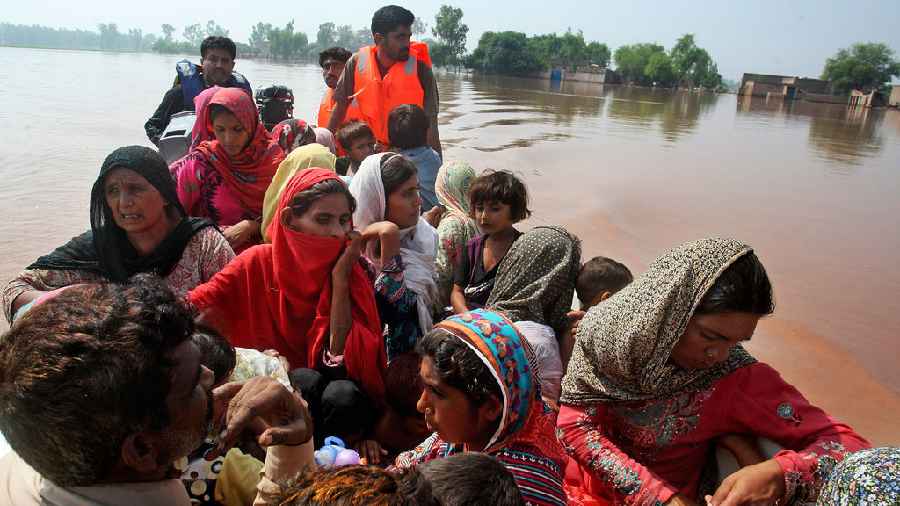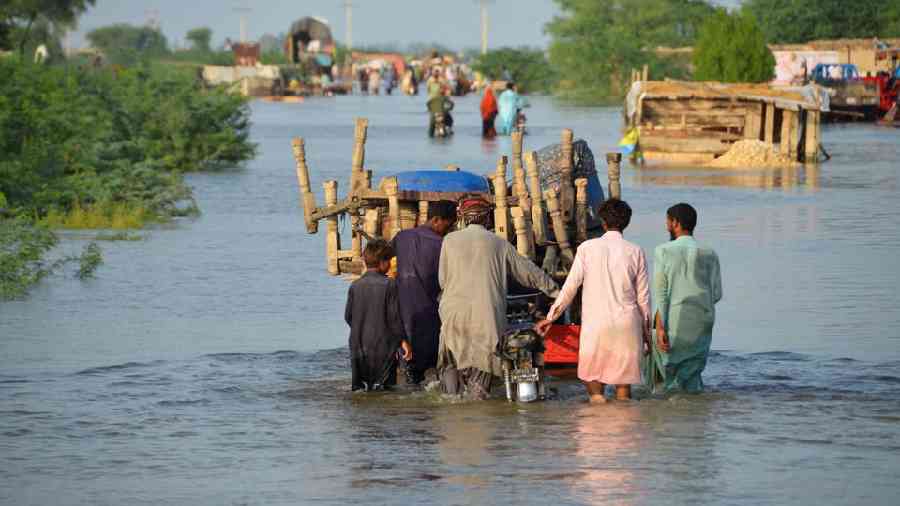At least 6,50,000 pregnant women in the flood-hit regions of Pakistan urgently need care to deal with the unprecedented natural calamity that has left more than 1,100 persons dead and affected over 33 million others, according to an UN agency.
The United Nations Population Fund (UNFPA) also warned that there was an increased risk of gender-based violence (GBV) against women and girls as almost a million houses were damaged in the floods that have wreaked havoc across Pakistan since early June.
According to the UNFPA, a sexual and reproductive health agency, which has painted a bleak picture of women affected by the unprecedented floods, over 73,000 of the 6,50,000 women, who are expected to deliver next month, are in dire need of maternal health service.
Up to 73,000 women expected to deliver next month will need skilled birth attendants, newborn care, and support, the Dawn newspaper cited the UN agency as saying.
Stressing that pregnancies and childbirth could not wait for emergencies or natural disasters to be over, the agency said that a woman and baby are most vulnerable and need utmost care during this hour of crisis that has deluged a third of Pakistan.
UNFPA is on the ground, working with partners, to ensure that pregnant women and new mothers continue to receive life-saving services even under the most challenging conditions, ac ting UNFPA Pakistan Repre sen tative Bakhtior Kadirov said.
Asking the world to step up relief efforts, the UN agency said over 1,000 health facilities were either partially or fully damaged in Sindh -- the worst affected region in the current flood situation, while 198 health facilities were damaged in Balochistan.
Over 1,600 persons have been injured and nearly 735,000 livestock -- a significant source of livelihood and food -- have been lost in the flooding that has also damaged roads and more than two million acres of agricultural land.
The damage to roads and bridges also compromised girls' and women's access to health facilities, the UNFPA added.
We will continue to support health facilities with the equipment and human resources to be fully operational despite the challenging humanitarian conditions, said Kadirov.
In a bid to ramp up its emerge n cy response, the UNFPA Pakis tan procured 8,311 dignity kits, 7,411 newborn baby kits, and 6,412 clean delivery kits for immediate delivery to Sindh, Balochistan, Khyber Pakhtun khwa and Punjab.
The UN agency said it was also prioritising gender-based violen ce prevention and response serv i ces, including medical and psychosocial support, to survivors of assault.
Meanwhile, UN High Com mis sio ner for Refugees Filippo Grandi asked the international community to step up its support and help Pakistan in responding to the catastrophe as the UNHCR delivered relief items in the worst-hit areas of Balo ch is tan and Khyber Pakhtun kh wa.
Rain and floods have been catastrophic for millions of people. We urgently need global support and solidarity for Pakistan in these dire times,'' said Grandi.
More than 6.4 million people across Pakistan need immediate support in response to torr ential rains and flash floods that have since June displaced hundreds of thousands, who are now living in camps or with host families.
According to the UNHCR, the agency has to date provided assistance amounting to over USD 1.5 million in the form of eme rgency relief items, including tents, plastic tarpauli ns, sanitary products, cooking sto ves, blankets, solar lamps, and sleeping mats.
The Federal Minister of Planning and Special Initiatives Ahsan Iqbal said the initial economic losses from floods in Pakistan could reach at least USD 10 billion.
The monsoon season runs from July to September in Pakistan. This year monsoon and pre-monsoon rains broke the 30-year record in Pakistan and the NDMA data shows that the 30-year average precipitation was 130.8 millimetres but the rainfall in the 2022 season was 375.4 mm.
Iqbal added that it might take five years to rebuild and rehabilitate the nation of 200 million people, which will be facing an acute challenge of food shortage.












